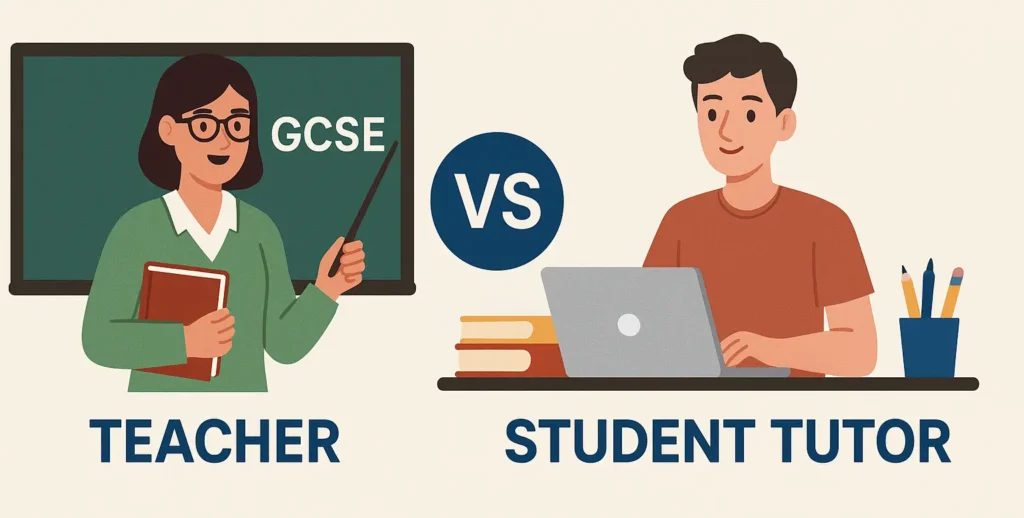GCSE Tutor: Teacher vs. Student – Which One Should You Choose?

🎓 Choosing a GCSE Tutor: Why the Right Fit Matters
If you’re deciding between a qualified teacher or a student tutor, this guide will help you understand the pros and cons of each type of GCSE tutor — teacher vs. student — so you can make the best decision for your child
Hiring a tutor for your child’s GCSEs is a smart move — but how do you decide between a qualified teacher and a student tutor?
Both options offer value, but they serve different needs. In this guide, we break down the differences to help you make the right decision based on your child’s goals, confidence, and current performance.
This article explores the difference between a GCSE tutor teacher vs student, helping you make an informed decision based on your child’s needs.
✅ Qualified Teacher: Experience, Depth & Reliability
A qualified teacher brings more than subject knowledge. They bring classroom-tested strategies, understanding of exam requirements, and behaviour management skills — all backed by research.
📊 What the evidence says:
A UK government review found that tuition by qualified teachers consistently leads to better student outcomes than tuition by non-qualified adults or peers.
High-quality 1:1 teaching has been linked to Bloom’s 2-sigma effect, where students perform two standard deviations better than average — placing them ahead of 98% of their peers.
Benefits:
Full curriculum coverage aligned with AQA, Edexcel, or OCR
Strong grasp of exam mark schemes and strategy
Behaviour and motivation support for struggling or disengaged learners
DBS-checked and professionally trained
Best for: Students working toward a pass or trying to move up to Grades 6–9
Need 1:1 or small group support? Learn more about our GCSE tutoring services.
👨🎓 Student Tutor: Relatable and Research-Backed in the Right Context
Student tutors can offer an approachable, peer-like experience. And under the right conditions, this can actually be powerful.
📊 What the evidence says:
The Education Endowment Foundation (EEF) reports that peer tutoring can lead to an average of 5–6 months’ additional progress when used to reinforce previously taught material.
Studies show positive effects for secondary students, especially when student tutors are trained and the sessions are structured.
Benefits:
Closer in age, often boosting rapport and engagement
Recently sat the same exams, offering relatable revision strategies
Affordable support for top-up help or short-term revision
Best for: Independent or high-achieving learners looking for flexible or affordable help
⚖️ Quick Comparison: Teacher vs. Student Tutor
| Feature | Qualified Teacher | Student Tutor |
|---|---|---|
| Curriculum Expertise | ✅ High | ⚠️ Varies |
| Exam Board Knowledge | ✅ Strong (AQA, Edexcel, OCR) | ⚠️ May lack depth |
| Teaching Techniques | ✅ Tried & tested | ⚠️ Informal/helpful tips |
| Cost per Hour | 💷 Higher | 💷 Lower |
| Rapport | 👌 Professional | 👍 Peer-style connection |
| Ideal For | Gaps, strategy, progress | Light support, revision |
🧭 Final Thought: Match the Tutor to Your Child’s Needs
There’s no one-size-fits-all. Some students thrive with a teacher’s structured approach; others benefit from peer-like encouragement and relatable revision advice.
Whatever you choose, the most important factor is consistency, quality, and rapport.
✨ Why Families Choose VLE Tutors
At VLE Tutors, we believe in delivering transformational support — not just help with homework. That’s why all our tutors are fully qualified UK teachers with years of experience, up-to-date curriculum knowledge, and a passion for helping students succeed.
👉 Book a free assessment to discover what type of tutor support is best for your child.
Frequently Asked Questions
Q: Is a teacher or student better as a GCSE tutor?
A: Qualified teachers offer structure, curriculum expertise, and experience. Student tutors may be more relatable and ideal for light revision, but the best choice depends on your child’s academic goals and learning style.
Q: Is online tutoring effective for GCSE students?
A: Yes, online GCSE tutoring can be very effective when sessions are well-structured. Both teacher and student tutors can engage students successfully using digital tools and interactive teaching methods.
Q: Do student tutors know enough to teach GCSE content?
A: Many do, especially if they’ve recently taken the exams themselves. However, they may lack deeper understanding or teaching strategies that qualified teachers provide.
Q: Will my child fall behind in a small group session?
A: Not if the group is well-structured. At VLE Tutors, we cap groups at 3–5 students and ensure every learner receives individual attention from a qualified UK teacher.
Q: How do I know which tutor type is right?
A: Book a free 20-minute consultation. We’ll assess your child’s needs and recommend the right support — whether that’s 1:1 with a qualified teacher or small-group tutoring.
